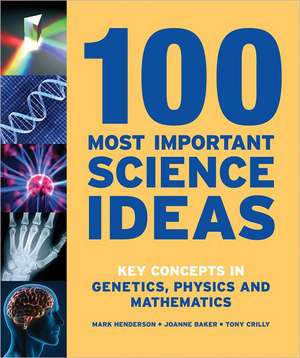100 Most Important Science Ideas: Key Concepts in Genetics, Physics and Mathematics
Autor Mark Henderson, Joanne Baker, Tony Crillyen Limba Engleză Paperback – 31 mai 2011
" "Highly recommended for high school, college, or university libraries. And since readers with no scientific background would also find the information fascinating, the book would be a great addition to the circulating collections in public libraries.""
-- Library Journal
"100 Most Important Science Ideas" presents a selection of 100 key concepts in science in a series of concise and accessible essays that are understandable to the layperson. The authors explain the answers to the most exciting and important scientific questions, which have had a profound influence on our way of life. Helpful diagrams, everyday examples and enlightening quotations highlight the straightforward text.
All the big ideas that readers would expect to find are present, and each is discussed over two to four pages. The authors use concrete applications to describe many of the abstract ideas, and some entries have a timeline along the bottom showing when the idea originated and its development.
Examples are: What can DNA reveal about the history of human evolution? Why does the moon orbit the Earth while the Earth orbits the sun? How will genetic medicine revolutionize healthcare? How did chaos theory become so ordered?
"100 Most Important Science Ideas" also includes brief biographies of iconic scientists and entertaining anecdotes from the world of scientific discovery. It is an indispensable overview of science for anyone who wants to understand the world around them.
Preț: 114.41 lei
Nou
21.89€ • 22.86$ • 18.12£
Carte indisponibilă temporar
Specificații
ISBN-10: 1554079489
Pagini: 431
Dimensiuni: 170 x 198 x 28 mm
Greutate: 0.75 kg
Editura: Firefly Books
Notă biografică
Joanne Baker studied natural sciences at the University of Cambridge and did her PhD at the University of Sydney. She is a physical science editor at "Science" magazine.
Tony Crilly he has written and edited many works on fractals, chaos and computing, and he is the author of the acclaimed biography of the English mathematician Arthur Cayley.
